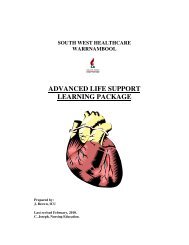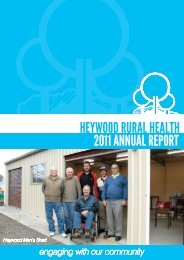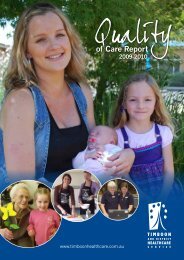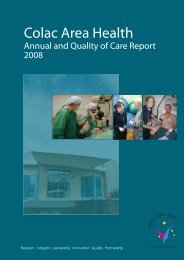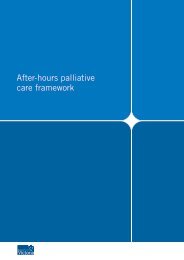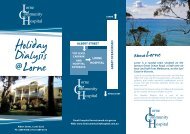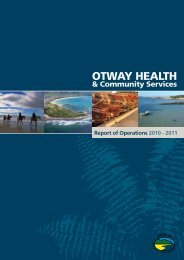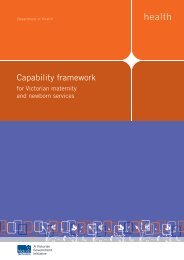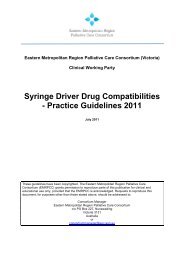Self Directed Learning Package - University of Queensland
Self Directed Learning Package - University of Queensland
Self Directed Learning Package - University of Queensland
- No tags were found...
Create successful ePaper yourself
Turn your PDF publications into a flip-book with our unique Google optimized e-Paper software.
140 • The Palliative Approach ToolkitMyths about opioidsOpioids (e.g. morphine, oxycodone or fentanyl) area type <strong>of</strong> strong analgesic.Sometimes residents, family members and even agedcare staff may have concerns about these medications.It is important to know that, when used correctly,opioid medicines:Do not lead to addiction or dependenceOpioid medicines are not addictive when used for pain.Addiction only occurs when people have no pain andthey abuse opioid medicines.Do not hasten deathMorphine and other opioid medicines are for improvinglife – not hastening death. Some people fear that beingprescribed opioid medicines means that they’re closer tothe end. However, relieving pain changes the quality-<strong>of</strong>life– not its length.Do not cause terrible side-effectsAll medicines can have side effects. The side effects <strong>of</strong>opioid medicines (constipation, drowsiness, nausea, drymouth) are usually manageable.WriteDocument your actionsMany residential aged care facilities expect careworkersto document information on assessment charts and inthe clinical record.Avoid general statementsPOOR COMMUNICATIONGOOD COMMUNICATIONEvaluation <strong>of</strong> interventions for pain ‘with ‘Resident states pain has reduced to 2/10effect’ or ‘effective’.score (was 5/10)’.ReviewEvaluate and reassess as necessaryThinking PointYou identified that Alfred has pain. You helped himstraighten up in bed, massaged the painful area (asdirected in the care plan) and asked the nurse aboutsome analgesic medication. Great job! Can you tickthis <strong>of</strong>f your list? Not quite yet. There is an importantquestion to answer: Did your strategies work?You can check the effectiveness <strong>of</strong> your management strategiesby asking the resident to rate the severity <strong>of</strong> their pain again(using a rating scale), observing their behaviours or facialexpression, or asking if their mood, sleep or function hasimproved.Key PointOnce you review and reassess a resident it is veryimportant that you pass this information on to anurse (and document your assessment if this is part<strong>of</strong> your role as a careworker).



